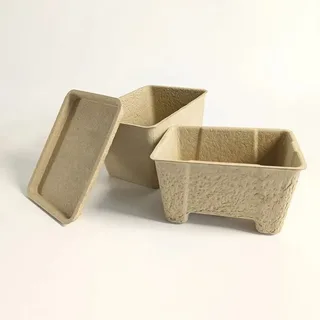How Businesses Can Switch to Molded Fiber for Sustainable Growth
Molded fiber is an eco-friendly material made from recycled paper, cardboard, and other natural fibers. It is primarily used in packaging, offering a sustainable alternative to plastic and Styrofoam. Businesses across industries are increasingly adopting molded fiber due to its biodegradability, recyclability, and minimal environmental impact. By transitioning to molded fiber, companies can reduce their carbon footprint and appeal to eco-conscious consumers.
The benefits of molded fiber go beyond sustainability. It provides excellent protection for packaged goods due to its shock-absorbing properties. Additionally, molded fiber packaging is lightweight, reducing transportation costs while maintaining durability. With governments and consumers pushing for greener solutions, businesses that embrace molded fiber gain a competitive edge by aligning with environmental regulations and market demands.
Steps for Businesses to Transition to Molded Fiber
Switching to molded fiber requires a strategic approach, starting with an assessment of current packaging materials. Businesses should conduct an internal audit to identify where molded fiber can replace plastic or foam-based packaging. Collaborating with molded fiber manufacturers is essential to determine the right specifications for different products.
Once the transition plan is in place, businesses should conduct pilot testing to evaluate performance, cost-effectiveness, and consumer response. Employee training on handling and using molded fiber products is also crucial to ensure a smooth implementation. Additionally, companies can leverage marketing strategies to highlight their commitment to sustainability, enhancing brand reputation and customer trust.
Cost Considerations and Long-Term Savings
One of the major concerns for businesses considering molded fiber is the initial investment. While the upfront cost may be higher than traditional packaging, the long-term savings make it a financially viable choice. Bulk purchasing, supplier partnerships, and improved production efficiency can significantly reduce costs over time.
Moreover, governments offer incentives and tax benefits for companies that adopt eco-friendly packaging solutions. Businesses can also reduce waste management costs since molded fiber is recyclable and biodegradable. Additionally, using molded fiber can prevent potential fines and penalties related to non-compliance with environmental regulations, making it a cost-effective solution in the long run.
Enhancing Brand Image Through Sustainability
Consumers are increasingly prioritizing sustainability when choosing brands. By switching to molded fiber, businesses can align with consumer values, fostering stronger brand loyalty. Companies that proactively adopt eco-friendly solutions demonstrate corporate responsibility, making them more attractive to investors and customers alike.
Furthermore, sustainability certifications and eco-labels can enhance credibility. Displaying these certifications on molded fiber packaging reassures consumers of a brand’s commitment to environmental conservation. Businesses can also engage in awareness campaigns and corporate social responsibility (CSR) initiatives to showcase their dedication to a greener future.
Overcoming Challenges in Adopting Molded Fiber
Despite its numerous advantages, switching to molded fiber comes with challenges, such as limited supplier availability and higher production costs. To mitigate these obstacles, businesses should conduct thorough market research to identify reliable suppliers with competitive pricing. Establishing long-term partnerships with manufacturers can also secure better deals and consistent supply.
Another challenge is ensuring molded fiber meets product-specific requirements, such as moisture resistance or structural integrity. Businesses can invest in innovation and research to enhance the material’s capabilities. Collaborating with packaging experts and sustainability consultants can help tailor molded fiber solutions to meet industry needs effectively.
Conclusion
The transition to molded fiber is a crucial step toward sustainable growth for businesses. By adopting eco-friendly packaging solutions, companies can reduce environmental impact, comply with regulations, and enhance brand reputation. While challenges exist, strategic planning, supplier collaboration, and innovation can help businesses successfully switch to molded fiber. Investing in sustainability today ensures long-term benefits, making molded fiber a wise choice for forward-thinking enterprises.

